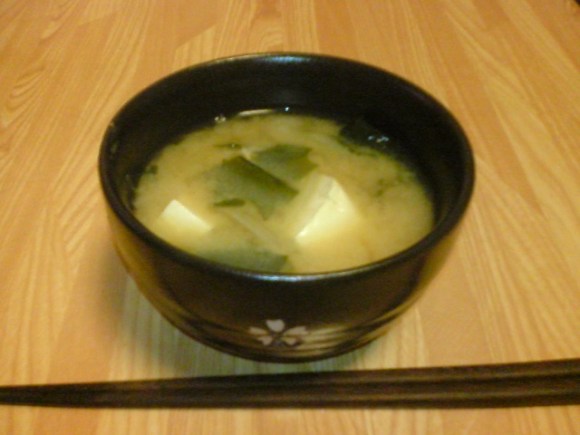
Miso soup is a staple of the traditional Japanese diet and has long been anecdotally connected with Japanese people’s famously long life expectancy. Now, research has linked consumption of miso soup with a reduced risk of stomach and breast cancer.
Japan’s cancer rates are low compared to western countries, but the country’s relatively high rates of stomach cancer have often been blamed on the high sodium content of the traditional Japanese diet. However, research suggests that miso, the fermented soybean paste which makes the base of miso soup and many other Japanese dishes, could actually counter-act the harmful effects of sodium consumption and even smoking.
A study conducted by Japan’s National Cancer Center showed that people who eat miso soup daily are less likely to die from stomach cancer, especially men. The thirteen-year study, which involved over 265,000 men and women over forty, found that people who eat miso soup daily are 33 percent less likely to contract stomach cancer than those who never eat it. Furthermore, smokers who ate miso soup daily were actually less likely to die from stomach cancer than non-smokers who didn’t eat miso.
▼ Vats of miso paste.
High salt consumption is associated with elevated blood pressure, but research conducted at Kyoritsu Women’s University in Tokyo by Dr. Yoshio Uehara suggested that the sodium in miso paste does not have the same effect on blood pressure as an equivalent amount of sodium consumed without miso. The study compared rats who were given salt with those who were given miso containing the same amount of salt. Rats who consumed the salt in miso form did not display the expected raised blood pressure, suggesting that miso does not affect the cardiovascular system in the way that other high-sodium foods can.
Miso has also been connected with reduced risk of breast cancer. Japan’s Ministry of Health, Labour and Welfare followed over 20,000 women aged 40-59 over a ten-year period. They found that compared to women who had one bowl of miso soup daily, those who had two bowls were 26 percent less likely to develop breast cancer. For those who had three bowls a day, rates of breast cancer dropped by 40 percent. Seiichiro Yamamoto, who led the research, says that miso soup contains isoflavins, which are known to inhibit the development of breast cancer.
▼ Varieties of miso.
Of course, there are a number of unanswered questions. Because miso is typically consumed in soup with a variety of other ingredients, “it is also possible that [the beneficial effect] merely reflects the effect of some frequent accompaniment to soybean paste soup, such as green-yellow vegetables”, states T. Hirayama. However, the reduced stomach cancer risk was significant even when age, district, socioeconomic status, dietary patterns, and smoking habits were taken into account.
It has been stressed that eating too much miso soup should be avoided, because of its high sodium content. It seems that miso has some impressive health benefits, but it hasn’t been conclusively shown to what extent, or why. Until then, everything in moderation seems like a good maxim to follow.
Sources: Hachimakiko, News Post Seven, NCBI, BBC
Top image: Wikipedia
Other images: Obuse Kanko, Wikipedia (1, 2)